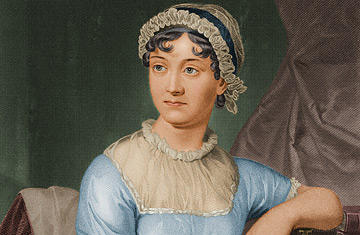
Jane Austen circa 1790
(2 of 2)
Ultimately the flirtation came to nothing, and Lefroy went on to marry an heiress and become Lord High Justice of Ireland. Becoming Jane does its best to flesh out an episode about which historical information is scant, since Cassandra burned most of the relevant letters. Much is made of suggestive maybe-coincidences, like the fact that Lefroy would name his first daughter Jane. But the result is stately and quite affecting, and the matter it inquires into is one of the supreme mysteries in all of literary biography: Austen, the greatest chronicler of romantic courtship in any era and any language, never married. While her characters passed by the dozen into the Promised Land, she remained behind.
This curious fact underscores a truth frequently neglected about Austen's England, that life there was often difficult and painful for women. Unless they were fortunate enough to have some kind of financial autonomy, women were essentially forced to sell themselves as commodities on the marriage market. The possibility of downward mobility was ever-present, lurking beneath the thin ice of their own charm and attractiveness. To preserve their value, women worked hard to safeguard their fragile sexual respectability, as defined by the Byzantine social codes of the day.
Austen's adapters have to tread a perilously narrow, wobbly line between grim historical honesty and the seductions of Regency glamour. "Because it's very pretty clothes and very pretty houses, the danger is that it just looks very chocolate-boxy and cute, an escapist thing really," says Julian Jarrold, who directed Becoming Jane. "Part of the point of the piece is how dictated economics and money were, and the whole marriage market, and how that dominated women's lives." The margins of Austen's novels are strewn with miserable spinsters and hollow marriages—her stories end happily, but she always makes it clear that her heroes and heroines are the exceptions, the lucky statistical outliers. "I've got a bit of an argument with a lot of the more traditional admirers of Jane Austen, and also fans of costume drama," says Davies. "These are stories about young men and women at a very crucial time in their lives, when they're boiling over with hormones, and they're in a society in which—for the girls at any rate—you usually only get one chance of getting it right, and if you don't you're on the shelf for life, and often financially disadvantaged." He pauses for reflection. "Although I must say, I do like the costumes."
It may have been brutal and unfair, but it is an essential aspect of Austen's authorial personality that she did not rail against the system she wrote about, or try to change it. "The real Austen is very satiric, and ironic," says Claudia Johnson, a professor of English at Princeton whose books include Jane Austen: Women, Politics, and the Novel. "She's very dubious about the world she lives in, but she's not radical, or revolutionary. She does try to explore ways of finding pockets of resistance and independence in a world that's pretty grim." Austen is not, in other words, a Romantic rule-defying rebel. (Charlotte Bronte, queen of the Romantic novel, on Austen: "she ruffles her reader by nothing vehement, disturbs him by nothing profound: the Passions are perfectly unknown to her; she rejects even a speaking acquaintance with that stormy Sisterhood.") There is a suggestion of Orwellian despair in Austen: as in 1984, her characters cannot hope to break the iron cage around them, can only clear a little space inside it where they can be themselves. Austen's upper lip is defiantly stiff. (Johnson notes, fascinatingly, that at the turn of the 20th century, Austen's reputation was as a man's novelist, not a woman's—her hard-boiled, buttoned-down, unsentimental attitude was considered insufficiently feminine.)
Austen played the game, in other words, and she knew it was a game. But that doesn't mean she denied herself pleasure in the skill with which she played. This may, paradoxically, represent a hidden source of her current appeal: in our present period of romantic anarchy, when men and women are socially and financially equal, and love is supposed to be about hooking up and breaking the rules, Austen made the delicate art of obeying rules—even cruel, arbitrary rules—sexy. "I wonder if the fact of the formality of getting together, the rules of engagement, the obstacles that are necessary to overcome, have an appeal for young women," says Rebecca Eaton, executive producer of Masterpiece Theater's The Complete Jane Austen. "Particularly now, where getting together is pretty easy. Maybe there is an appeal to it — a yearning for it." It's certainly true of Austen's art, if not of her life. "I think these Jane Austen stories have a great advantage over contemporary stories," Davies says, "in that you can delay the actual consummation of love till the very end of the book, in fact after the end of the book. Whereas modern stories, very often they f--- on the first date, and where's the story going to go after that?"
In her life Austen played the marriage market and lost, but it's presumptuous of us to assume that she was unhappy because of it. After all, there are other kinds of happy endings besides love, and this is a truth that Austen surely knew, even if she chose not to write about it in her work. "Don't you think there's great happiness in writing a novel like Pride & Prejudice?" asks Johnson. "I think she enjoyed her life. Writing was a passion too."
